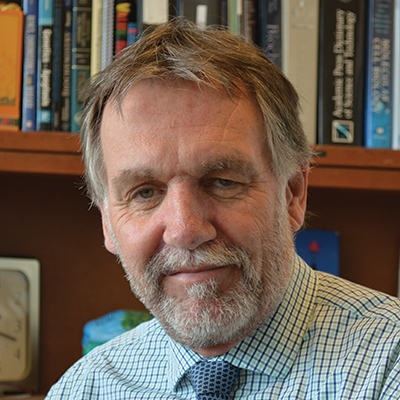Gordon Shore (1945—2018)
Gordon Shore, a professor at McGill University, passed away Sept. 7 after a long and courageous battle with pancreatic cancer. We remember him as a wonderful husband and father, a steadfast friend and supporter of the community of biomedical scientists in Canada and abroad.
 Gordon ShoreGordon Shore, a professor at McGill University, passed away Sept. 7 after a long and courageous battle with pancreatic cancer. We remember him as a wonderful husband and father, a steadfast friend and supporter of the community of biomedical scientists in Canada and abroad.
Gordon ShoreGordon Shore, a professor at McGill University, passed away Sept. 7 after a long and courageous battle with pancreatic cancer. We remember him as a wonderful husband and father, a steadfast friend and supporter of the community of biomedical scientists in Canada and abroad.
Mitochondria were the center of Gordon’s scientific life. The coincidence of the endosymbiotic origin of mitochondria and the origin of eukaryotes has captivated life scientists. Today, understanding mitochondrial function and dysfunction is key to understanding overall eukaryotic cell function and the cellular basis of human disease. Gordon’s contributions to our knowledge of mitochondria began with his early studies that revealed the significance of the links between mitochondria and the endoplasmic reticulum, or ER, in mammalian cells and culminated in elucidating the roles of mitochondria in cell survival and cell death and the relevance of these processes to disease, especially cancer.
Gordon’s early work in mitochondria was done as a postdoctoral fellow with Jamshed Tata at the National Institute of Medical Research in Mill Hill, United Kingdom, now part of the Francis Crick Institute in London. In 1977, Shore and Tata uncovered an association between mitochondria and ER that they posited contributed to mitochondrial biogenesis and function. Today we understand in great depth the molecular details validating this hypothesis, extending to the acquisition of lipids for mitochondrial biogenesis, to calcium flux, to the mechanisms underpinning mitochondrial division and cell death.
After he was recruited to Montreal in 1977, Gordon carved out his niche in the mitochondrial world. In a field of giants like Günter Blobel, Gottfried Schatz and Walter Neupert, Gordon made seminal contributions to our understanding of the transcriptional regulation of mitochondrial metabolic enzymes and molecular mechanisms that drive protein import and insertion into mitochondrial membranes in mammalian cells.
In the early 1990s, Gordon began a long friendship with the late Stanley Korsemeyer to focus on apoptosis and the roles Bcl-2 proteins play in this process. With the virologist Philip Branton, Gordon used the well-defined adenovirus infection model of apoptosis to unravel the mechanisms of cell death, cell death suppression and the links between these mechanisms and cancer. The intricate dance of the ER and mitochondria to coordinate cell death and cell death suppression was defined through Gordon’s work on Bcl-2 family members BID and BAX, and BAP-31. Gordon together with his former graduate student Heidi McBride, now a professor at McGill, described the contribution of dynamin-related protein 1 in the remodeling of mitochondrial cristae upon activation of BIK and showed this process is mediated by the stabilization of ER contact sites required for calcium uptake and cytochrome c release.
Gordon was an inspiring leader in translating his findings on the ER-mitochondrial axis and autophagy to the clinic. In 1988, he cofounded with Philip Branton a biotech company, GeminX, that developed a first-in-class Bcl-2 inhibitor that targets this process. Gordon expanded his role in drug development as the chief scientific officer at Therillia, a Montreal pharmaceutical company that identifies candidate drugs for the treatment of cancer. Truly, Gordon had a profound impact on our understanding of the basic biology and clinical implications of mitochondria. He has left an indelible mark on his chosen field of research.
Gordon’s scientific contributions are valuable and long lasting, but when those of us who knew him think of him, we will most remember his qualities as a friend and colleague. He was a kind, supportive, optimistic friend who made our lives the better for knowing him. He will be sadly missed.
We thank Kate Beckingham of Rice University, Houston; Phil Branton, Heidi McBride and Dave Thomas of McGill University, Montreal; Jam Tata of the NIMR, London; and Walter Neupert, University of Munich, Martinsreid, for comments and remembrances.
Enjoy reading ASBMB Today?
Become a member to receive the print edition four times a year and the digital edition monthly.
Learn moreGet the latest from ASBMB Today
Enter your email address, and we’ll send you a weekly email with recent articles, interviews and more.
Latest in People
People highlights or most popular articles

Building a career in nutrition across continents
Driven by past women in science, Kazi Sarjana Safain left Bangladesh and pursued a scientific career in the U.S.

Kiessling wins glycobiology award
She was honored by the Society for Glycobiology for her work on protein–glycan interactions.

2026 ASBMB election results
Meet the new Council members and Nominating Committee member.

Simcox wins SACNAS mentorship award
She was recognized for her sustained excellence in mentorship and was honored at SACNAS’ 2025 National Conference.

From humble beginnings to unlocking lysosomal secrets
Monther Abu–Remaileh will receive the ASBMB’s 2026 Walter A. Shaw Young Investigator Award in Lipid Research at the ASBMB Annual Meeting, March 7-10 in Washington, D.C.

Chemistry meets biology to thwart parasites
Margaret Phillips will receive the Alice and C. C. Wang Award in Molecular Parasitology at the ASBMB Annual Meeting, March 7-10 in Washington, D.C.


